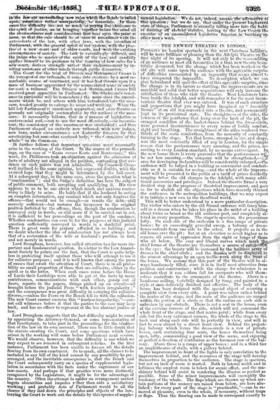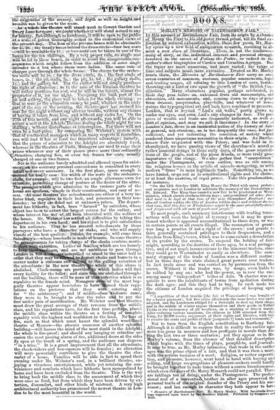THE 193WESII tilEATRE IN T.0.7.4DON.` TitO1C1B1.1" no 1,010 . 6i'4eaiiet6: 'in the
next Christmast *in- be More brilliant or pleasing than the Adelphi Theatre *st, 'night of its openinig. It will not only be the reasseratliSig an'tindience to meet old favourities in a bran new flu atre,h,eati,- trolly „decorated, but the change which has been worked on the old' §40 will come upon the audience with the agn.eable surprise of di rilties surmounted by an ingenuity that seems almost to haveonqucred the impossible. :No description which, we can give beforehand will spoil the effect of this agreeable surprise, since the change is in its nature so startling, the improvements are so manifold and solid that better acquaintance will only increase the satisfaction of those who visit flue theatre. -Most Londoners have been inside the Adelphi, and will remember it' for the most incon- venient ,theatre that ever was entered. It *as of such structure -and proportions that you might have imagined an " AsseniblY Rooms" at an old inn converted into a theatre, and permanently kept in its provisional state. The straightness of the sides, The lowness of the penthouse that hung over the back of the pit, the cramped condition of the basket-boxes behind the dress-circle, were personal inconveniences to every sense of bodily comfort, sight and breathing. The straightness of the sides rendered. two- thirds , of the seats comfortless, from the necessity 'of constantly turning to the stage. Yet that house, cramped ice size and shape, was the most constantly filled of any in London, for the simple reason that the performances were amusing, and the prices, ac- cording to every,Londonstaiadard, by no means extravagant. Is the new house there is every guarantee that the performances -be; no less amusing,--the company will be strengthened,— area for developing its faculties will be considerably enlarged,—t audience Will be lodged in a building as convenient and comfort- able. as it is suitable for seeing,—and the whole of the inprove- inerit willbe presented to the public at a tariff of prices decidedly ranging be/oze the old charges in the Adelphi, with Many addi- tional accessories and privileges. Indeed the theatre ferms a very decided step in the progress of theatrical improvement, and goes so far to abolish 'all the objections which have recently thinned the audiences in the metropolitan buildings, that we may expect it to initiate a new wra in the theafrical world.
This will be better understood by a more particular description. The visitor who enters by the old Strand entrance will fancy him- self in a dream when he takes his place in the midst of a building about twice as broad as the old audience part, and completely al- tered in every proportion. The stagels spacious, the proscenium lofty. On each side of the orchestia is a fine range of private boxes ; by an exceedingly graceful sweep, a balcony of dress- boxes extends from one side to the other. It 'projects as in the old house over the pit ; but at an elevation so much higher as to remove all sense of oppression from the sight or lungs of those who sit below. The easy and liberal curves which mark chief forms of the 'theatre are themselves a source of satist-,-..*= to the eye ; the beauty will be increased by the brilliant array of dresses in the chief circle ; and the dresses will- be displayed to the utmost advantage by an open trellis-work along the front of the boxes. We assume that this part' of the theatre will be al- ways handsomely filled, since it is in itself most attractive from position and construction; while the charge for admission is so moderate that it can seldom fail for occupants who will them- selves contribute to the ornaments of the theatre. Above is a handsome ceiling, tastefully designed by Sang, and painted in a style at onee delicately finished and effective. The body of the house has been designed with the special object of securing a complete view from every side. A point was taken rather behind the centre of the stage, and the seats of the audience are ranged within the portion of a circle so that the radius on each side is unbroken by any obstacle. There is not a seat in the house, even at the extreme corners of the side, which will not command the whole front of the stage, and that centre point; while from every side but the very extremest corners, the whole of the stage to the back and along each side will be perfectly in view, and will in fact be seen almost by a direct front view. Behind. the project- ing balcony which forms the dress-circle is a row of pnvate boxes, each containing four seats, the boxes themselves being open, lofty, commanding a good view of the scene, and enjoying as perfect a freedom of ventilation as the foremost row of the bal- cony. Above these is a range of upper boxes ; and in a third tier an amphitheatre of stalls, with a gallery behind.
The improvement in front of the lights is only correlative to the
improvement behind, and the resources of the stage will develop themselves in proportion to the audience. The stage is spacious, but not an inch of room is wasted. Both in' lateral width and in loftiness the amplest room is taken for scenic effect, and the ma- chinery behind will assist in rendering the illusion as perfect as possible. Some of the minor improvements will exemplify the tendency- of the whole. The flaps which are thrown up when cer- tain portions of the scenery are raised from below, are here abo- lished; for every part of the stage is "practicable,"—can be re- moved at pleasure, even to the whole, iinecessary, without traps or flaps. Thus the flooring can be made to correspond exactly to you will find ft agi'lai 1 ' gtJ itiViihtir A. ykntiii, t'Illeiael , rendered those emporiunisinecessitiosinetheitskigin:, ;As .liartho- whereas'inidkiri6aties Of LIDA0i6;lit&I,akerit are ers&P a raise their • thurchvard; we have passing views. of the churchnen'e. moral or ' prieeaWhethivet !"-aily of their! Iiieetis !prolve • inore!tliiiiilordiatirily I rather iiainoral,deinge in those early clays, Of the gross supensti- ttractivei charging five, or even' ten - francs fen. ! seats; usually tions:Ori tolaeeneeple, and of the. pious frauds, or mere truly gas changed at•oae.or two:francs. - impostures: of ihe clergy. .Wo also gather that " competition"
• . fn Vile A
7r:IL In P 1P ;Abel present:doe i li litriti .164-.6titt-roi,lutat • to,t poGtitiOy.i.ii One'of the rgie?h Ri4s9w,,toesseg, t5 1.43.,t'#1i '.. L'', fi0, h:7711.4.t..-„b' Aliir i a_Lt#115eglo seat ixml '..t.4.9r3i,Ii9Natiw;;Ut enatemeatcolaeLpersonid siteuggle a, 4Ak bit . eY - unsr; ms . Ate V yine406gr..ecaa:Nseenn- ' ed.:ill. the- eareernsf, 4PaliaiveaieLiPatdevelov,indeedein: the . eau athlete anig L 1Ww. bow :.thes ,•sid 'tianocaraconvi. augle audit:leg-other biegiriaphies4ifleardereaUdI tit/radius. Agri pp. /3u t If- ereineal box uilseref,tbeneilwisreAtidies. The ;nape ',Tate of thV, 14,ies are more intesqii4:"iiint 'More varied ; the re of 941%041'0We( ' h piil iielelichWen The char"... t tlie,orches- f,444'44, #4,j cats 41,44,490.,;04eAoh.p. , : , l'irc9ese: es Ale; Aez ley 1 prlit4 ilia tatalit & ' `It. 'ItbicrOitiele 5s -'' ' 1iii o 'of intiaa:ethere,, the ZenoisiklinfielAisteniae4seeae,Bizie, eerry -as over 11•12114 .t • . 1. C, ,1.1 , ' ' !..'7' 1 .t Q , eboxee, le. • staisp , tir p2t,,Is. 6dee ,e ily, I is, :neven eentearies of .,miannense oustonni; popular smausements, legal T ' 4-1; linerfte" g' y tci.' a the ."Otfor \\Rigs , tyik,..0 ikee and trading usages, all relating eto this London of ones, besides i lIth;tf tsiiilift-Alt do,A iitu biwotti 'ill ItAl 'beiiible to gress of wealth and trade re frequently indicated, as well as ti Waxi,ssencies .of ' e scenery, and- • eptn as we ;breadth can be giveneto the scene. di of gaignoled jdz 111 519W Wu= 1111.4.."!',D 5
ieftliwatbeietre will atandoittratt ,to.-Opviintificardeld an
Litt*
"at Alton* -a Ctiqiii layAlerke undeieofinni[P-iiiteeven J..an4.,(1.4•Yebauges its face. The pro- l • .t.'gfc ft I - • L.‘ . .
-
VAtag- 114#12 VitY, b-StAN1 •M'AI .141 81 °MA. 444. 'WANDA . -;VIii*AP
LI
ibeatsufibibtat baxositaidl,beie tainabl A
17015
• 111
11412 ea 1,01, 14 friany rippOts fiesr eneefeeett the contrary personal-convenience consulted in every • detail and-osery accessory. In 'the first place, space enough is 41koured for bodily ease: the width of the seats in the orchestra- -galls, for example, will be tvio feet, an ample allowanbe even for eistinoline, permitting change of posture at the desire of the sitter. The passages whiola give admission to the various parts of the house are spacious, simple in their construttion, and easy of ac- cess. At most theatres the refreshments are either of a very in- ferior kind, repuleive in their look, and poisonous in their ten- dencies; or they ate doled out at unknown prices. The depart- ment has hitherto, in fact, been "farmed" by outsiders, whose object has been to extort the largest return for the outlay, and whose interest has not at, all been identified With the welfare of the house. Mr. Webster has settled all difficulties by taking this department in his own hand; and his object is to give satisfaction to his audience. Thus he has secured. refreshments by those purveyors who have a character at stake, and who will supply viands of the best quality. Drinks, for example, will come from Saiiasbuifs—whose lemonade is made of lemons. In some theatres - ments for taking charge of the cloaks combine morti- • fi to. I.4mdon in order that they may corner under a staircase an the attendants: in the new thee abolished. Cloak-rooms are provide every facility for the toilet ; and since out the building, there will be none of that extortion which is so repulsive to the female mind. Managers Alm. of the most beg- garly theatres appear heretofore to bare -*mat their regu- lations on the pretence that they werb catering only for " the aristocracy "; and if middle-class'itisitants came, they were to be brought to obey the rules and to pay the fees under pain of mortification. Mr. Webster seeslhat theatres must draw the great average of their revenue from. the middle class, and his regulations have, for the first time perhaps, placed the middle class within the theatre on a footing of liismplete equality with the highest and wealthiest in the land. Noqear of fire, such as that which must haunt the splendid woodned theatre of Moscow—the phoenix successor of another spleaffitil building—will harass the mind of the most timid in the Adele/if-4e the whole is fire-proof; and should any hanging or crinoline oc- casion the most passing alarm of fire, additional at the sides fly open at the touch of a spring, and the audience can disperse in a trice." It is a great improvement that all the attendants, the cheek-takers and box-oeeners will be females; no alteration will more powerfully contribute to give the theatre the cha- racter of a home. Families will be able in fact to. spend their evening under Mr. Webster's roof, in a brilliant theatre, en- joying a vivacious entertainment, while yet retaining the con- veniences and comforts which have hitherto been monopolized by home and have been excluded from the theatre. This is the way to bring back the middle class to the amusement of which they were once so fond, but from which they have been driven by ex- tortion discomfort, and other kinds of mistrust. A very high architectural authority has pronounced the newest theatre in Lon- don to be the most beautiful in the world. extortion. Ladies of familietwhich are too homely ages, and are not ambitious to pass through To m• lied to stand in the outer hall in epesit cloaks and bonnets in a to the galling extortion of e whole of this abuse is which ladies will find are abolished through-



























 Previous page
Previous page